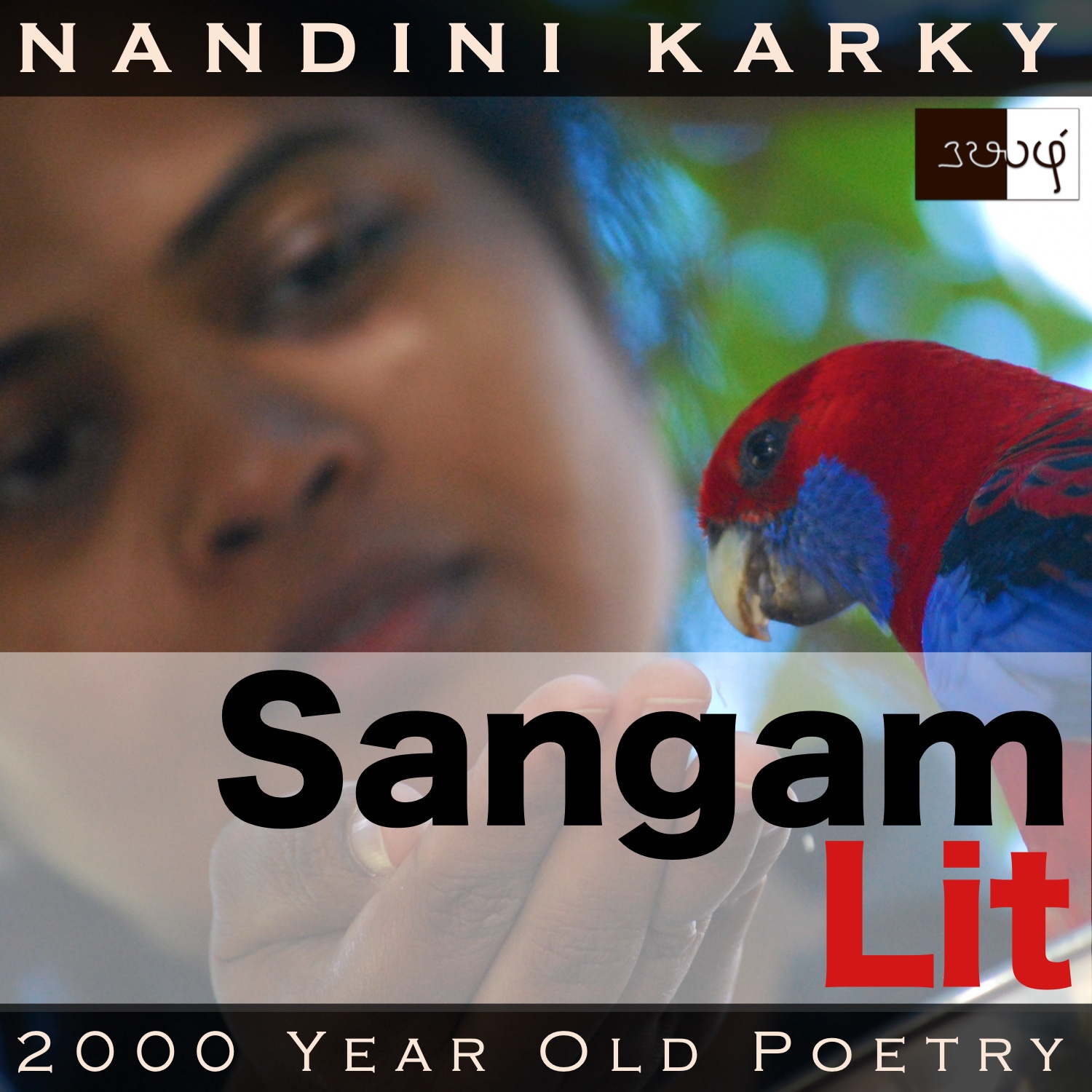Podcast: Play in new window | Download
Subscribe: Apple Podcasts | Spotify | Amazon Music | Android | iHeartRadio | TuneIn | RSS | More

In this episode, we observe a mother’s state of mind, as portrayed in Sangam Literary work, Natrinai 143, written by Kannakaaran Kotranaar. The verse is set in the ‘Paalai’ landscape or ‘drylands’ and speaks in the lamenting voice of a mother, after her daughter elopes with the man.
ஐதே காமம் யானே, ஒய்யெனத்
தருமணல் ஞெமிரிய திரு நகர் முற்றத்து
ஓரை ஆயமும் நொச்சியும் காண்தொறும்,
நீர் வார் கண்ணேன் கலுழும் என்னினும்
கிள்ளையும் கிளை எனக் கூஉம், இளையோள்
வழு இலள் அம்ம தானே, குழீஇ
அம்பல் மூதூர் அலர்வாய்ப் பெண்டிர்
இன்னா இன் உரை கேட்ட சில் நாள்
அறியேன் போல உயிரேன்,
‘நறிய நாறும் நின் கதுப்பு’ என்றேனே.
Opening with ‘ஐதே காமம்’ meaning ‘astonishing is love’, the poem dwells on the curious nature of this thing called ‘love’. The word ‘தருமணல்’ indicates ‘fresh, new sand’ and ‘திரு நகர் முற்றத்து’ clarifies that it’s positioned ‘in the courtyard of an excellent mansion’. There’s mention of ‘ஓரை’, the game played by young girls and ‘நொச்சி’ or ‘chaste shrub’, grown in Sangam households. ‘கிள்ளை’ talks about a ‘parrot’ and ‘கிளை’ elaborates not a ‘branch’ as in contemporary language, but the ‘bond’ between kith and kin. ‘அம்பல் மூதூர்’ brings forth an ‘uproarious old town’ and ‘அலர்வாய்ப் பெண்டிர்’ paints a portrait of the ‘gossiping ladies’ in that town. The verse finishes with a dialogue spoken – ‘நறிய நாறும் நின் கதுப்பு’, meaning ‘there’s a distinct fragrance in your hair’. Let’s understand the significance of these seemingly simple words!
The lady’s mother discovers that her daughter has eloped with the man, leaving her house and playmates. Shocked by this happening, she says, “Love is surprising indeed! Whenever I glance at the fresh new sand, spread in the courtyard of our fine mansion, when I glimpse at her friends playing the game of ‘orai’, and when I see the ‘gnochi’ shrub blooming therein, instantly my eyes fill with tears. Even more than me, wallows that parrot she reared, which calls out ‘mother’ affectionately. And yet, my young girl is blameless, for sure! The gossiping women of this slanderous, ancient town got together and spoke those bitter-sweet words of blame. Hearing those words, for a few days, I acted as if I knew nothing and let out not, even a breath about it. All I said, one day, was ‘your hair has a different fragrance’. Alas, those words of mine!” With these words, the lady’s mother wishes that she had not uttered those words which made her daughter leave their home.
How can talk of the fragrance in a girl’s hair push her to leave her family? An exploration of social customs and relationship dynamics will reveal the reasons why. The lady’s mother begins by giving voice to her feelings of missing her dear daughter. She mentions the fine sand in front of their mansion, the lady’s playmates engaged in a game of ‘orai’ and the ‘gnochi’ shrub the lady cared for in their house. When someone close to us leaves elsewhere, it’s natural that the places they tread on, the people and objects we associate with them, evoke a feeling of sadness. As described by that apt, Tamil equivalent coined in a film song for the phrase ‘missing you’ – ‘உன் இன்மையை உணர்கிறேன்’, which translates to ‘I feel your absence’, the mother is overcome by the absence of her daughter all around her and her eyes brim with tears. Even in her pain, she sees that the parrot reared by the lady is in much more agony, crying out ‘mother’, ‘mother’, as it searches for the lady.
After giving expression to inner feelings, the mother concludes that her daughter’s actions are blameless. For what else could she do, given the circumstances? The ladies of that ancient town had got together to spread gossip about the lady’s relationship with the man. Although news of this had reached the mother’s ears, she pretended as if she was not aware of anything. She describes how she did not even let out a breath about it. This age-old expression reminds me of the contemporary Tamil phrase, “மூச்சுக்கூட விடல” talking about the utter secrecy maintained about an incident. Words may change but the meaning seems to have survived over the centuries. The mother concludes by saying that all she mentioned was that the lady’s hair had a different fragrance and this is why the lady left her home. What has the hair’s fragrance got to do with the lady leaving? Turns out, during their courtship, the man had brought a different flower from his country and had given the lady. That flower was not to be found commonly in the vicinity of the lady’s house. Wearing that flower in her hair, made the lady’s hair have a different scent. Merely hearing her mother mention this, made the lady think that mother had come to know of her relationship with the man and fearing confinement, she decided to leave her home with the man.
The lady’s mother, with these words, expresses her feelings of pain but at the same time, decides that her daughter did the right thing, given the situation. A song of making peace with the painful past!




English la sollitiga konjam antha poem ah tamilaium explain pannita nalla irukum…..
Thirukural ku yeppadi Tamil la porul vilakam varuthu antha mathiri ….
It would be best if you refer to the explanations by multiple Tamil scholars over the years. As you seem to know the Tamil language well, treat this as a small spark to lead you to the light of great scholars like Pinnathur Narayanaswamy, Avvai Duraisamy and Silamboli Chellappan, to name a few.